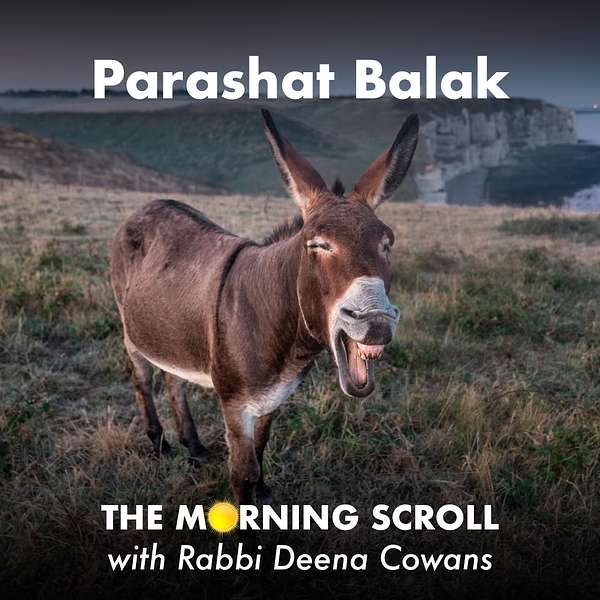
The Morning Scroll
The Morning Scroll
Parashat Balak, July 21st
Use Left/Right to seek, Home/End to jump to start or end. Hold shift to jump forward or backward.
Sometimes, the words just come out wrong. And sometimes, they come out of your donkey. This episode, we read one of the top three most buck-wild, sexual, violent, and miracle-stuffed portions in the whole Torah, and ask: "Hey! What is Mah Tovu doing here?"
Produced by Mishkan Chicago. Music composed, produced, and performed by Kalman Strauss. See our upcoming Shabbat services and programs here, and follow us on Instagram and like us on Facebook for more updates. Check out Shabbat Replay on Contact Chai for more from Rabbi Deena.
Transcript
Welcome to The Morning Scroll! I'm Rabbi Deena Cowans from Mishkan Chicago and you're listening to what will be a quick dive into this week's parsha. If you’ve been meaning to brush up on your Jewish literacy, or you’re looking for some inspiration, you’ve come to the right place. This week, we read Parashat Balak, the name of a king with a pretty reasonable fear of the Israelites and a pretty bad plan to take them down. We’ll start with a brief recap:
Balak, king of Moab, hears about the Israelites destroying some of his neighbor kingdoms, s he asks the priest Balam to go curse the Israelite camp. God appears to Balam in a dream and is like “oh no your don’t”, which Balam tell to King Balak, but the king is insistent. So Balam saddles up his trusty donkey, and once again God comes in a dream, saying “OK you can go but you will only say what I tell you.” On the journey, a sword-wielding angel blocks their path, and Balam’s donkey is like “Heck no I don’t mess with sword-wielding angels' ' so she stops walking. Balam gets pissed and hit her, and she turns around to him and is like “excuse me what did I do to deserve that?! I obviously can’t walk through that VERY OBVIOUS angel with a sword!” The Balam sees the angel, and is chastised for hitting his donkey. Balam finally makes it to Moab, and tells the king to build 7 altars to offer sacrifices. Balak tries to tell Balaam the curses to say, but when Balam speaks, blessings come out. Balak is, understandably, pissed, so they relocate to a new mountain to try again. Well, this does not work, and once again Balam only has nice thing to say about the Israelites. They try a third time on a third mountain, but… you can guess what happens. So, disappointed, Balak sends Balam away. Before he leaves, he offers one pretty ominous prophecy about the end of days, then the Moabite women take matters into their own hands and go into the Israelite camp to seduce them and make them worship Baal. Now God is really pissed, so God tells Moshe to kill anyone who was seduced, and also a plague breaks out. Pinchas, son of Elazar the new high priest, sees two people engaged in some sexy inter-tribal acts and stabs them through with a sword, dun dun dun.
There’s a lot to love in this parsha, but one line is definitely the most famous: mah tovu ohalecha ya’akov, mishkenotecha yisreal, how good are your tents, Jacob, your dwelling place, God wrestlers! We say it every morning at the beginning of our prayer service, traditionally just as we are entering our prayer space. Which feels sort of unexpected, that we begin our communal prayer every morning by repeating a line that was supposed to be a curse uttered by a foreign priest of a different God. What is so special about this line? Our sages had the same question.
The Talmud in Bava Batra says that when Balam looked out over the Israelite camp, he noticed that everyone had pitched their tent with the opening facing away from other tents, giving each family a measure of privacy even in the crowded and intimate camp. This, apparently, was so moving that this blessing came tumbling out of his mouth. So why do we repeat it every morning as we enter a communal prayer space? Perhaps because it reminds us that we’re each bringing our own thing, our own baggage with us, and that the goal is to give everyone enough privacy to be with their own stuff… while also coming together as a community to build intimacy and closeness. It’s like saying “I’m here if you need me, but you don’t owe me any information about your life.” Our responsibility to each other is to be there, not to pry or try to eavesdrop, but to make ourselves available and approachable.
For this, I want to offer a blessing to the countless Israelite families who experienced family stuff- arguments and fights, disappointments and celebrations, and who didn’t need to worry about their neighbors being all up in their business while they were dealing with that, but who also knew that they were surrounded by a caring community who could and would help out. And to all of you, I hope you experience the blessing of space to live your life, and people close enough to call on when you need them.